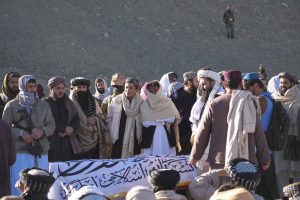A recent suicide attack killed Khalil Ur-Rahman Haqqani, the minister of refugees and repatriation in the Taliban regime in Kabul. The Taliban regime’s spokesman, Zabihullah Mujahid, confirmed the killing of the minister in a suicide bomb attack that killed five others. The Islamic State of Khorasan Province (ISKP) claimed responsibility. It was the first high-profile killing of a member of the Taliban regime since the group came into power after seizing Kabul three years ago.
Khalil Haqqani was a senior member of the Haqqani Network who was named a Specially Designated Global Terrorist by the U.S. government in 2011, with a $5 million bounty on his head. Khalil Haqqani was the uncle of Sirajuddin Haqqani, a senior leader of the Haqqani Network and the interior minister of the Taliban. Sirajuddin Haqqani is also designated as a global terrorist by the U.S. government, which offers a reward of up to $10 million for information leading directly to his arrest.
Over the years, the Haqqani Network has gained the reputation of being especially fearsome and lethal due to its tactics. The group was the first faction of the Taliban to embrace and adopt suicide bombings; the Haqqani Network started using this tactic, learned from from al-Qaida, back in 2004. Given its growing influence within the group, the Haqqani Network remained part of the broader Taliban during the last two-and-a-half decades. However, it is rumored that this partnership will change now.
The assassination of a senior Haqqani Network member brought to light the growing fission between the Taliban’s Supreme Leader Hibatullah Akhundzada and Sirajuddin Haqqani – tension that has been growing over the past three years. According to Afghanistan’s Hasht-e-Subha Daily newspaper, Akhundzada recently summoned Taliban commanders from various Afghan provinces and warned them about their loyalties to Haqqani. If they sought positions and privileges, then they should move to Kandahar, the Taliban’s founding city and spiritual center, rather than Kabul, Akhundzada allegedly said.
Hasht-e-Subha Daily claimed that Akhundzada summoned these Taliban commanders after they met with Haqqani upon his invitation. During the meeting, these commanders are said to have expressed their dissatisfaction with the supreme leader’s recent reshuffling of the government.
This growing rupture among the Taliban factions was also evident in the recent remarks made by Haqqani during a graduation ceremony at a madrassa in the Paghman district of Kabul province. During his speech, Haqqani said, “Religion should not be represented in a way that suggests it belongs solely to me, to the exclusion of others.” He added, “We should not declare that people are corrupt and that we must reform them or save them from apostasy because we are in power. If people are leaning toward disbelief or corruption, it reflects the shortcomings of those in power.” His remarks were seen as a camouflaged critique of the Taliban’s supreme leader, indicating the growing fractions among the regime.
Additionally, it is also claimed that immediately after the death of his uncle, Sirajuddin Haqqani summoned all his senior commanders from Afghanistan’s northern provinces to Kabul for a meeting that lasted until late into the night. The Haqqani Network decided during the meeting that it would withdraw all its members from Kabul and other provinces and relocate to Khost and Paktia. The shift by the Haqqani Network seems to imply that Sirajuddin Haqqani and his close circle blame Akhundzada’s intelligence apparatus for Khalil Haqqani’s killing. However, there has been no public statement from the Haqqani Network regarding parting ways with the Taliban.
Amid these reports of a growing fissure between the Taliban’s supreme leader and the Haqqani Network, Taliban’s Deputy Prime Minister of Economic Affairs Mullah Abdul Ghani Baradar refuted the claims during the funeral gathering for Khalil Haqqani near Gardez, the capital city of Paktia province, “There is enough love and friendship among our leaders,” Baradar said. “Do not listen to rumors or let them trouble your mind. May Allah strengthen and sustain this system.”
His remarks were perhaps a nod to the attendance of different factions at the funeral, including Gulbuddin Hekmatyar – the leader of Hizb-e-Islami, who reportedly has a troubled relationship with the Taliban’s Kandahar faction. As per observers, the funeral gathering was meant to display a united front between the different factions amid the conjectures of growing fission within the Taliban leadership.
At the same, there was a conspicuous display of arms and security guards at the gathering, which not only underscored the different faction’s rising concerns vis-à-vis the security of their leaders after Khalil Haqqani’s murder but also exposed the increasing mistrust within the leadership of different Taliban factions.
Among these speculations, a question arises about whether the Haqqani Network will separate from the Taliban, and if so, what consequences the Taliban’s supreme leader may face. It would certainly weaken the Taliban’s overall position in Afghanistan, as the Haqqani Network is considered to be the most powerful faction of the Taliban and Sirajuddin Haqqani is believed to be the primary military strategist of the Taliban. Moreover, the Haqqani Network also administers 20 provinces in Afghanistan.
If the Haqqani Network decides to part ways with the Taliban, it will result in a weakened regime in Afghanistan. In that event, the country may face the risk of another civil war due to disputes over control of the provinces.

































